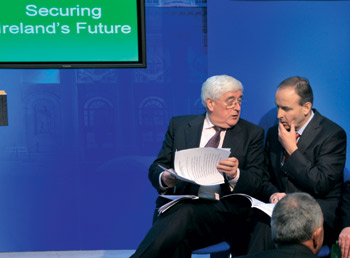Retail sales collapse demonstrates bailout failure

While many may hope that the worst of the recession is over, Dan White assures us that, in fact, the worst is yet to come
20 June 2011
The latest dreadful retail sales figures, which showed that retail sales fell by a further 3.9% in the year to April, demonstrate yet again that the Irish economy is mired in a deep 1930s-style depression. Until there is a radical shift in economic policy Ireland is doomed to endure a “lost decade” of deflation, emigration and sky-high unemployment.
Terrible retail sales figures
The April retail sales figures weren’t just bad, they were absolutely terrible. The latest numbers from the CSO show that the value of retail sales is now down by a quarter from its 2007 peak. Even when traditionally volatile motor sales are excluded, retail sales have fallen by more than 16% since 2007.
This collapse in sales has had devastating consequences for the retail sector. A slew of high-profile Irish retailers including O’Brien’s Sandwich Bars, bookseller Hughes & Hughes, music store chain Golden Discs and, most recently, Xtra-vision, have been forced to seek protection from their creditors, more often than not landlords with upward-only leases who have refused to lower rents to more realistic levels.
The sales collapse has fed through into retail employment with Retail Excellence Ireland estimating that the retail sector has already shed 40,000 jobs since the downturn began with a further 30,000 jobs under threat. If these predictions are borne out then approximately a quarter of all workers in the retail sector stand to lose their jobs by the time the downturn finally bottoms out.
Won’t work, can’t work
The desperate plight of the retail sector is a microcosm for what is happening throughout the domestic Irish economy. With the banking system having effectively collapsed at a cost, so far, to the taxpayer of €70bn, the implosion of the property market having vaporised 170,000 construction jobs and blown a €10bn hole in the exchequer finances, and the resurgent euro putting the squeeze on domestic producers, it is already clear that, just seven months later, the November 2010 EU/IMF “bailout” isn’t working. That’s because it can’t work. With the EU and the ECB’s no-writedown strategy forcing the Irish taxpayer to shoulder the entire burden of the banks’ losses, the economic growth that is vital to generate any meaningful increase in tax revenues simply can’t happen.
Budget deficit target pushed out
In the four-year plan published to accompany the bailout, the previous government penciled in average annual GDP growth of 2.75% in the four years to the end of 2014 and that this economic growth would generate almost half of the projected €11bn increase in tax revenues required to reduce the budget deficit to 3% of GDP by 2014. This 3% of GDP budget deficit target has now been pushed out to 2015 by the new government.
However, the latest retail sales figures merely confirm what a slew of reputable international bodies have already said, that the Irish economy, even when one uses the misleading GDP measurement, which includes repatriated multinational profits, rather than GNP, which excludes them, isn’t coming even remotely close to achieving annual growth of 2.75%.
Taxes will have to increase
In its most recent review of the Irish economy the IMF predicted GDP growth of just 0.5% this year, not much more than half of the 0.9% growth it was predicting for 2011 as recently as last December. Meanwhile the EU has cut its 2011 forecast for Irish GDP growth from 0.9% to 0.6%. Based on these forecasts virtually all of the €11bn increase in tax revenues the government is hoping for over the next four years will have to come from tax increases rather than economic growth.
With the government already committed to pushing up the VAT rate from its current 21% to 23% over the next few years where will all of this lead?
Will we see a recurrence of the absurd situation that prevailed in the 1980s when then Finance Minister, and current Anglo Irish Bank chairman, Alan Dukes increased the VAT rate on some items to 35%?
Cannot tax our way out
During those years the upper rate of income tax also soared to 70% and, surprise, surprise, the Irish economy ground to a halt. A similar set of policies this time out will produce virtually the same result. You cannot tax your way to recovery – Labour Party please note!
Unfortunately things aren’t as bad now as they were in the 1980s, they’re much, much worse. Even in the depths of the 1980s downturn we never lost our economic sovereignty and the banks, just about, stayed solvent. It may have been a close run thing but we somehow managed to preserve our access to the international capital markets and keep the IMF wolf from the door.
While the national debt briefly approached 120% of GDP during the 1980s, Ireland’s current true level of indebtedness is almost certainly much, much higher. Ireland’s “official” national debt stood at €104bn at the end of May, according to the NTMA, the equivalent of “only” 72% of GDP.
Real debts
However, that isn’t even the half of it. Throw in the €100bn which the ECB has lent to the Irish-owned banks and the €50bn of lending from the Irish Central Bank, effectively the ECB’s Irish subsidiary, and the total exposure of the Irish taxpayer jumps to over €250bn. To this must be added the €40bn of NAMA bonds received by the Irish banks in return to their bad loans to builders and property developers and the remaining €55bn or so which the government hopes to draw down from the EU/IMF bailout over the next few years and the gross total rises to at least €300bn.
Even if one allows for some double-counting in these figures, which don’t include €35bn of senior bank debt where the government is stubbornly refusing to force the bondholders to accept discounts, it is difficult to see how the “real” Irish national debt is much less than €300bn, almost 200% of GDP and a massive 240% of the more relevant GNP figure.
Deluded nonsense
The notion that the Irish economy, particularly one about to be hit with further painful tax rises, can somehow miraculously repay all of these debts is dangerous, deluded nonsense. As the collapse in retail sales demonstrates, the Irish people have already figured this one out for themselves. How long will it be before our political leaders do likewise?



 Print
Print






Fans 0
Followers